Nothing Found
Sorry, no posts matched your criteria
Sorry, no posts matched your criteria
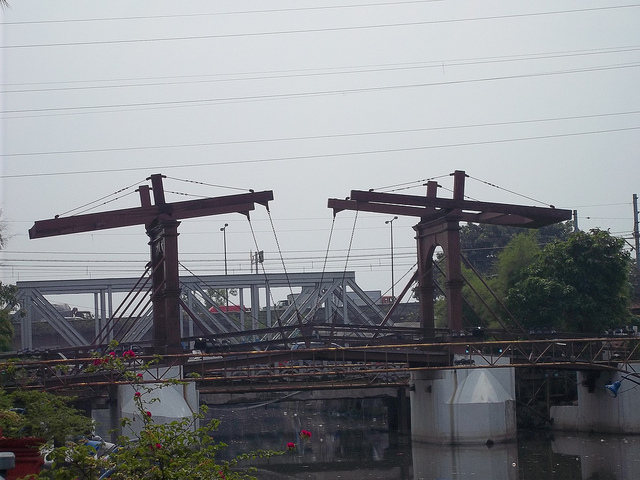
Huong Le Thu’s recent study on Southeast Asian perceptions of the Quadrilateral Security Dialogue (the informal grouping of the US, Japan, Australia and India, commonly known as the Quad) found that Indonesians were among the most ambivalent towards it.
In response to the question, ‘Do you support the Quad?’, more than 50% of Indonesians surveyed chose, ‘Not now, but maybe in the future’. If we assume that the survey result reflects Indonesia’s approach to regional dynamics, was the proportion of undecided respondents high because they weren’t able to make up their minds, perhaps due to lack of information? Or was it because they felt that indecision was the more favourable stance?
When Mohammad Hatta coined Indonesia’s bebas dan aktif (‘free and active’) foreign policy doctrine in 1948, it was generally hailed as the most appropriate response for a newly independent state to the superpower rivalry of the Cold War. Whereas bebas (often also translated as ‘independent’) meant staying outside of any binding military bloc, aktif meant vigorously battling colonialism and promoting world peace.
Adhering to these principles, Indonesia navigated the regional dynamics shaped by the Cold War and sought to keep the Southeast Asian region neutral in the bipolar rivalry by choosing not to ally with any blocs. That approach is illustrated by President Sukarno’s decision to found the non-aligned movement in 1955 and by President Suharto’s determination to keep ASEAN at a distance from great-power contestation after its establishment in 1967.
But the free-and-open policy wasn’t just fitting as a response to global dynamics; it was also the right choice for Indonesia, which lacked capacity in most of the sectors that would enable a stronger foreign policy, such as economic development, military capability and a stable political system. From that perspective, it was the cheapest and safest option.
Indonesia has continued to adhere to that doctrine. Even with no more blocs to choose from in the post–Cold War era, it still feels the need to declare itself free. And even though it has reached middle-income status and is acknowledged as one of the world’s highly developed countries through its membership of the G20, it still chooses the cheapest and safest option of not making affirmative decisions in many world affairs. Its approaches and policies on issues like the Rohingya crisis, China’s militarisation of the South China Sea, and the internment of Uyghurs are some examples that come to mind. On some of these matters, ‘free and active’ seems to be more of an excuse for inaction than a principle.
As Le Thu’s survey showed, the Quad faces some perception problems, including a common view that it antagonises China and challenges ASEAN. A total of 54% of all respondents saw the Quad as an ‘anti-China bulwark’. Having participated in various discussions on Indo-Pacific and regional security involving Indonesia’s policy and expert communities, we conclude that this is the common perception in Indonesia as well.
However, only 22% of Indonesian respondents gave a clear ‘No’ answer when asked whether they supported the Quad. The majority were undecided. Playing the free-and-active card? Perhaps. Supporting the Quad would seem like leaning towards an alliance with the US, while bluntly rejecting it risks being interpreted as lending a supporting hand to China.
We acknowledge that it’s not fair, or academically sound, to make this study the sole compass for our analysis of Indonesian foreign policy. But let’s stick to this argument as we present another factor in Indonesia’s often fuzzy approach to regional security, and ambivalent foreign policies in general.
We mentioned that domestic conditions were relevant to the free-and-active foreign policy, and they still are. The current administration has often been accused of assigning a low priority to foreign policy and therefore lacking a clear strategy for responding to regional dynamics. Discussions on the Indo-Pacific concept and the Quad come at a time when the nation is preparing itself for possibly the biggest national election in its history in 2019. And there are other more pressing items on the agenda, such as natural disasters and terrorism.
The Widodo government apparently avoids expending too much effort on foreign policy issues that aren’t popular among its people, and the Quad is no exception. At the same time, the government is extra careful not to put too much attention on Indonesia’s external relations so as not to provoke criticism from the opposition.
Taking these factors into account, an informal security framework such as the Quad doesn’t have strong appeal for Indonesia. Indonesia is preparing its own concept of the Indo-Pacific, which was introduced at the East Asia Summit in August (although so far it has had a lacklustre response, as seen in the mere mentions in the chairman’s statements at the most recent East Asia Summit and ASEAN summit).
The Indo-Pacific concept that Indonesia proposes is based on the following two principles: ‘Not to create a new mechanism or replace an existing one, but to enhance cooperation using the existing mechanism’, and ‘to keep maintaining [ASEAN’s] central role and mak[e] the Indo-Pacific region as an open, transparent, inclusive and respectful to international law and cooperative area by using the EAS mechanism as the main platform’.
From that description, we can deduce that the Quad isn’t part of Indonesia’s view of the Indo-Pacific. A straightforward rejection is unlikely to be included in any document explaining the concept, but the Indonesian government is going to shy away from engaging in further discussion of the Quad.
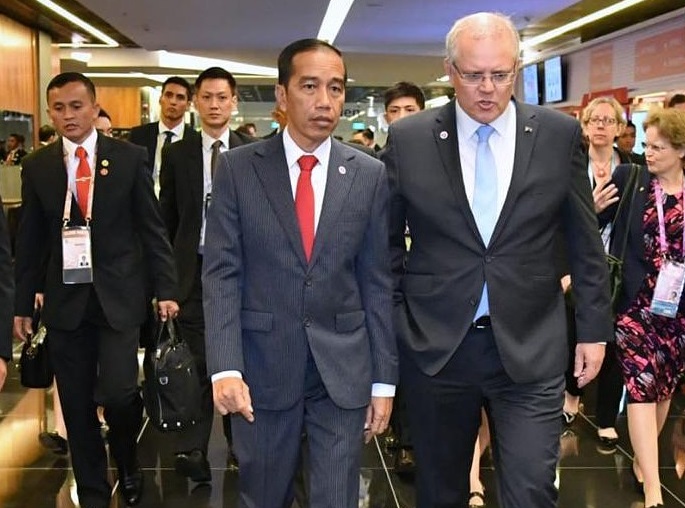
In September 2014, as revelations from the Edward Snowden affair roiled Australia–Indonesia relations, the late Sabam Siagian, Jakarta’s ambassador to Canberra between 1991 and 1995, offered the kind of frank appraisal of the bilateral relationship that could only be elicited by strong emotions.
Over a lunch in Jakarta, Siagian charged that Australia was ‘hardly a sovereign country’.
‘You have this ANZUS thing’, he said. ‘You still have this dominion [status] … You are hardly independent.’
He finished a long diatribe on Australia’s faults as an international actor—including the charge that Canberra was forever engaged in foreign policy overreach—with a rhetorical jab. ‘Who are you? That’s our question.’
The critique was especially sharp even for a man who had the admirable quality of speaking his mind. Siagian passed away in 2016. Right until the end, he was an influential voice on the bilateral relationship, having served as ambassador at the height of Prime Minister Paul Keating’s embrace of Indonesia. His chagrin at Australia was probably compounded because he actually saw himself as an advocate of a strong relationship.
The latest source of trouble in the Canberra–Jakarta relationship has been Scott Morrison’s decision to float the idea of Australia’s embassy in Israel being moved from Tel Aviv to Jerusalem. The proposal, which is now subject to a cabinet review, has prompted Jakarta to delay the signing of the Comprehensive Economic Partnership Agreement (CEPA), a trade deal of considerable symbolic significance, even if it lacks the substance of pacts Australia has negotiated with other partners.
As the world’s biggest Muslim state, Indonesia has obvious reasons for opposing the embassy move. It subscribes to the view that it would weaken the hand of the Palestinians if Israel were to be awarded upfront one of the key prizes in the negotiations over a two-state solution. With an election coming next year, in which President Joko Widodo needs to capture mainstream Islam, he could do without having to defend a decision to deepen ties with Australia, just as Canberra acts contrary to Palestinian preferences on an issue close to the hearts of Muslims.
This is the obvious motivation for Jakarta’s displeasure. But in the event Canberra drops the idea, the issue should blow over. Most commentators in Canberra seem to believe or hope that’s what will happen. After all, only two other countries—the United States, acting on an election promise made by Donald Trump in 2016, and Guatemala, led by an ex-comedian accused of embezzling election funds—have sited their embassies in Jerusalem.
As the Morrison government contemplates what to do, there are two other aspects of Indonesia’s handling of the embassy controversy—one negative and one positive—that might be worth bearing in mind.
The first resonates with Siagian’s comments following the Snowden affair. Officials in Jakarta often wonder whether Australia acts out of an independent assessment of its national interests or reflexively follows the lead of the United States on foreign policy.
Regardless of whether there’s any substance to Indonesian perceptions that where Washington goes, Canberra follows, it does Australia no good to pretend they don’t exist, and not just in Jakarta either.
A number of countries in Asia, including within ASEAN, have firm security ties with the US. Indonesia also would like to find ways to deepen its security engagement with the US, including opportunities to train the TNI special forces. There should be no intrinsic incompatibility between the maintenance of ANZUS and strong relations with Southeast Asia. It can even be an advantage.
But following the US lead on a foreign policy issue that ignores well-known regional sensitivities feeds doubts over whether Australia is entirely at home in Asia and able to set its foreign policy priorities firmly in the region.
There is nothing new in any of this. The perceptions have been there as long as Australia has engaged with the region, often emerging and subsiding according to the vigour with which Canberra has been seen to push an independent, Asia-focused foreign policy.
John McCarthy, one of Australia’s most distinguished diplomats, noted in a 2014 speech that Australia had become viewed in Asia and elsewhere as an American ‘satrap’.
After a period of foreign policy activism in Asia in the 1990s, Australia reverted to an American-led, security-driven agenda, catalysed by the terrorist attacks of 11 September 2001. McCarthy warned that Australia had sent the message that ‘we think Asia is less important than our relationship with the United States’, with the consequence that our neighbours might not take our views as seriously as they otherwise might have.
The second, and more positive, takeaway from the Israel embassy controversy is that Widodo’s administration has done everything it can to keep a lid on it. The decision to delay the signing of the CEPA is probably defensive, rather than an explicit rebuke to Canberra. Widodo still wants it to go through.
Morrison’s embassy proposal has miffed Jakarta, but the offence has been relatively muted. One measure of that is the absence of protests outside the Australian embassy. It’s normally a simple matter for activists to find a crowd in Jakarta. Instead, the administration quietly prevailed on Islamic organisations to exercise restraint and avoid backing Canberra into a corner.
That moderation would undoubtedly change if the government’s review actually resulted in an embassy move. In a late-night discussion two weeks ago, a senior Indonesian official could barely contain his indignation. In part, it was because some officials in Jakarta, like him, feel they have tried hard to put the Australia–Indonesia relationship on a more stable footing under the Widodo administration. Morrison’s proposal undermined those efforts and potentially gave Muslims another issue with which to rail against the West.
By sheer coincidence, Australia and Indonesia are likely to hold elections within about a month of each other next year. The winning sides in Canberra and Jakarta will have received fresh mandates at a time when regional challenges are intensifying amid competition between the US and China. It’s a time when both governments could benefit from greater collaboration.
Whether Morrison was motivated by politics or principle in his Israel embassy proposal, he should have his eyes firmly fixed on the priority of forging close cooperation with Indonesia rather than focusing on a distant foreign policy consideration over which Australia can exercise little influence and which will only undermine national interests closer to home.
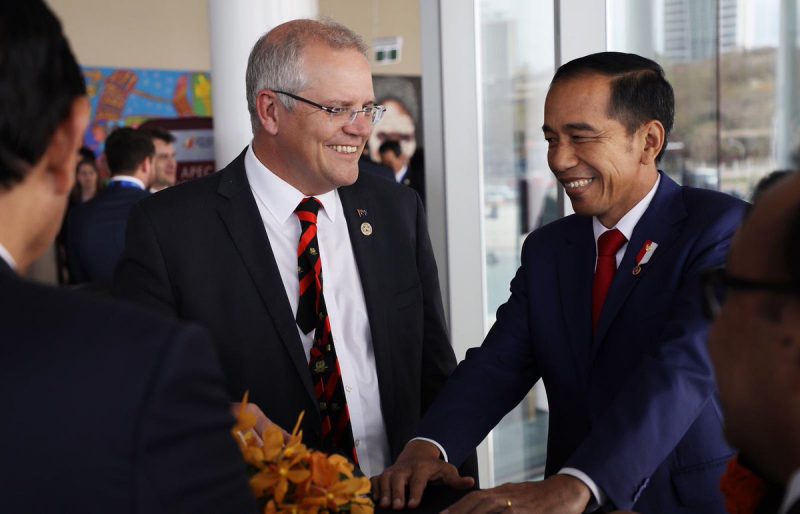
Indonesia and Australia were supposed to sign their long-awaited bilateral free-trade agreement last week at the East Asia Summit in Singapore. But the deal has apparently been put on hold.
Trade Minister Simon Birmingham said translation issues were partly to blame for the delay. But it’s hard to deny that Australia’s plan to relocate its embassy to Jerusalem loomed large.
Some Australian officials and politicians believe the embassy proposal is foolhardy, while others say that Indonesia shouldn’t ‘dictate’ Australian foreign policy. The issue, of course, isn’t about who dictates what. It’s simply that, as Newton’s third law says, ‘For every action, there’s an equal and opposite reaction’—even in foreign policy.
Will Jakarta unravel a trade deal that has taken years of painstaking negotiation over what some might argue is a ‘symbolic’, if not ‘emotional’, issue?
The Israeli–Palestinian conflict may not be Jakarta’s bread-and-butter national interest. But it touches on one of the key foundations of Indonesia’s foreign policy: the promise of independence and freedom from the debt of decolonisation.
Indonesian President Joko ‘Jokowi’ Widodo said that Indonesia’s support for Palestine stems from President Sukarno’s pledge in 1962: as long as Palestine is not independent, Indonesia will always stand opposed to Israel. That promise can be traced back to before Indonesia’s independence in 1945. Palestinian nationalists then supported Jakarta’s quest and even helped persuade Egypt to recognise Indonesia.
For better or worse, Palestine was part of the formative period of Indonesia’s ‘independent and active’ foreign policy. But the support for Palestine doesn’t mean that Indonesia’s foreign policy is strongly ‘Islamic’.
As the current Indonesian ambassador to the UK, Rizal Sukma, has written, Islam has never been the defining framework for Indonesia’s foreign policy. When the ‘Islamic factor’ comes into play, it is always driven by domestic political considerations.
This brings us to the second reason for Indonesia’s opposition to the embassy proposal: in an election year, a weak stance in the Israeli–Palestinian conflict could become a rallying cry to upset Jokowi’s re-election chances.
Ever since Jokowi named Ma’ruf Amin as his running mate, the opposing Prabowo Subianto/Sandiaga Uno camp has found it difficult to exploit religious sentiments as they did when they brought down Jakarta governor Basuki Tjahja Purmana last year.
The opposition has tried to scrape any potentially damaging issue, like the burning of Hizbut Tahrir’s flag by members of the Nahdlatul Ulama, Indonesia’s largest Muslim organisation and a critical Jokowi supporter. So far, we have yet to see any serious snowball effect that might ruin Jokowi’s re-election chances. But if Australia relocates its embassy, the opposition might finally have something.
The opposition has often painted Jokowi as a ‘neo-liberal’ who is ‘selling out the country’, as evident in Prabowo’s campaign speeches. The embassy move could inflame those attacks by adding a religious component.
An official with the National Mandate Party (PAN), a member of Prabowo’s coalition, noted that the proposal could affect Indonesians ‘at grassroots’ level and ‘some of them might be the radicals’. Civil society groups have also warned that if Australia follows through on the proposal, moderate and radical groups will see it as a ‘green light’ to ‘punish Australia’.
While the economic benefits of a free-trade deal are significant, it is politically risky to be liberalising trade in an election year—or ‘opening up the country to foreigners’, as the opposition might say—especially with a country that might be seen as hurting the Palestinian cause.
A combination of religious identity politics and anti-liberalisation rhetoric might be enough to give the Prabowo camp some momentum heading into the election.
Finally, the embassy move reignites a dormant but significant perception in Jakarta: that Australia always follows America’s lead, even it upsets its neighbours. Nadjib Riphat Kesoema, who served as ambassador to Australia from 2012 to 2017, even suggested that the Australian government should ‘distance yourselves a bit’ from the United States.
This highlights a more structural challenge in Indonesia–Australia relations: Jakarta’s perception that Australia is never fully part of the region because it can’t say no to Washington.
But that didn’t stop Jakarta and Canberra from signing a comprehensive strategic partnership in August—which elevated Australia’s position in Indonesia’s foreign policy calculus to the same level as America’s and China’s. And the Australia–US alliance also hasn’t prevented Canberra from boosting its Indo-Pacific credentials or supporting ASEAN’s centrality in regional architecture.
Bottom line: Indonesia’s resistance to Australia’s embassy move is more than an ‘emotional’ issue. While Australia’s alliance with America isn’t a deal-breaker for Indonesia or the region, Canberra should craft a more calibrated approach in balancing its alliance with its regional commitments.
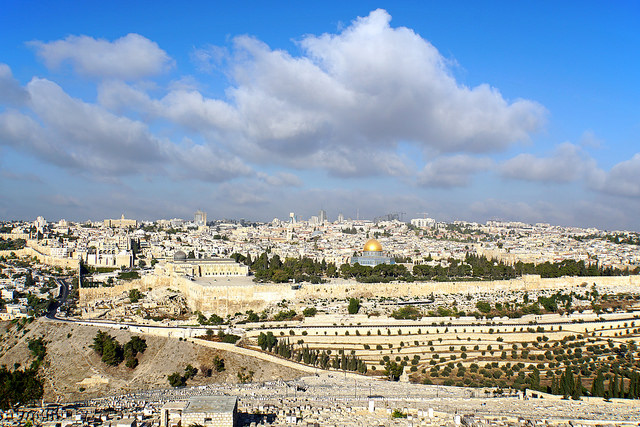
Prime Minister Scott Morrison’s announcements of a possible move of our embassy in Israel from Tel Aviv to Jerusalem and of a review of our support for the Iran nuclear deal threaten seriously to prejudice the Australian national interest.
The status of Jerusalem has been central to the Arab–Israeli dispute for more than half a century. Israel has been denied international recognition of Jerusalem as the capital of the Jewish state, particularly because that would presuppose the outcome of a negotiation between Israelis and Palestinians of a comprehensive two-state solution to the dispute.
Successive American administrations had supported this policy on a bipartisan basis—as have all our friends in NATO, with whom we have been associated in both Iraq and Afghanistan.
President Donald Trump’s decision to open a US embassy in Jerusalem was a radical shift in the United States’ historical position. The decision predictably drew strong criticism from Islamic states and the nonaligned world. More tellingly, it prompted adverse reactions from European states historically well versed in the intricacies of the Arab–Israeli dispute.
Following the American announcement in December 2017, Australia’s then foreign minister, Julie Bishop, did not deviate from existing Australian policy, noting that matters relating to Jerusalem were ‘subject to final status negotiations between Israel and the Palestinian Authority’ and that Australia would continue its diplomatic representation to Israel from Tel Aviv and its representation to the Palestinian Authority from Ramallah in the West Bank.
So why change now? The stated rationale was that we were going to vote ‘no’, presumably along with President Trump, Guatemala and a Micronesian state or two, on a UN vote which would support the Palestinian Authority as the chair of the developing countries’ caucus group, the Group of 77. That is arrant nonsense. We have voted ‘no’ on a plethora of Middle Eastern questions before without shifting our embassy to Jerusalem.
As all our newspapers have made clear, the real answer is that the announcement was a telling example of the aphorism of the late Speaker of the US House of Representatives, Tip O’Neill, that ‘all politics is local’.
But at what cost?
First, the Arab–Israeli question is not central to our foreign policy focus and international opinion is firmly against the position we envisage. It is bound to bring us into global disrespect. To some that may not matter, but one would hope that to those in government our international reputation would count.
It will prompt a more specific reaction from the Arab world. It is too soon to know what form that reaction will take, but there will be a reaction.
In our own region, both Pakistan and Bangladesh are Islamic states and will feel forced to take positions.
But most important for us will the reaction in Malaysia and Indonesia, both because our bilateral dealings will be affected and because their views affect regional attitudes towards us. Following the Trump decision there were widespread and lengthy demonstrations in both these countries and it would be surprising if our decision didn’t resonate as badly.
The timing is particularly unfortunate in relation to Indonesia.
Just for a start, the foreign minister of the Palestinian Authority is currently on a five-day visit to Jakarta.
Israel has denied both the current Indonesian foreign minister, Retno Marsudi, and her predecessor, Marty Natalagawa, entry to Ramallah unless they also visited Jerusalem. They didn’t do it.
Perhaps most significant, Indonesia is gearing up for next year’s presidential and parliamentary elections. Islamic issues already loom large in electoral rhetoric. It would be a matter of extreme regret if the success of Prime Minister Morrison’s early visit to Jakarta were to be upended by our position on Jerusalem.
President Joko Widodo is a friend of Australia and has pushed a free-trade deal with us, which could now be jeopardised. We cooperate on counterterrorism and have a serious dialogue on regional security that assumes added importance with the rise of China.
Since the blasphemy conviction of the former governor of Jakarta, Basuki ‘Ahok’ Tjahaja Purnama, Widodo has been vulnerable to charges that he is insufficiently sensitive to Islamic aspirations. He may be forced into taking positions regarding Australia that he would prefer to avoid.
The Iran issue will receive less attention, but the decision to conduct a policy review is also a serious mistake. We are buying into it to please Trump and the Israelis. While imperfect, the nuclear deal was regarded by President Barack Obama, our main NATO allies and Japan as holding the best hope for a non-nuclear Iran. While not party to the deal, we supported it. We have always taken nuclear nonproliferation seriously. It is a pity that we seem no longer to do so.
Morrison still has time to wind back on policies which, put simply, are bad for Australia. Let us hope he takes the national interest seriously enough to do so.
Editors’ note: This post is part of an ongoing debate on The Strategist about the status of Jerusalem. The Strategist plans to publish other views on Prime Minister Scott Morrison’s announcement that the government is considering moving Australia’s embassy in Israel from Tel Aviv to Jerusalem.
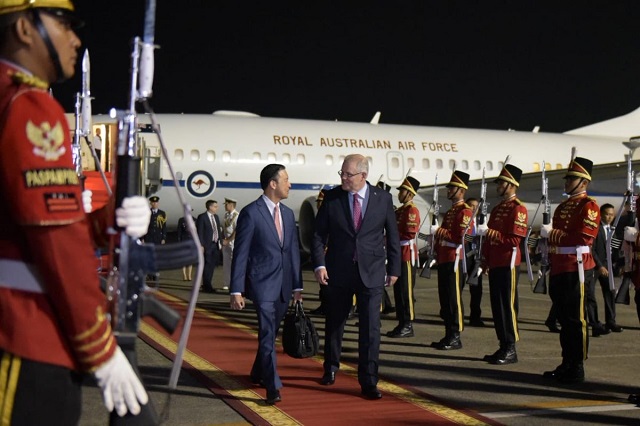
Scott Morrison is on his first overseas trip as prime minister—and it’s to Indonesia.
The immediate purpose is for Morrison and Indonesia’s President Joko Widodo to announce their two countries’ assent to a free trade agreement.
It’s more than that for the new prime minister, though. The fact that he has committed to the Indonesian visit at the very start of his tenure as leader, at a point when the demands for his time and attention are extraordinary, shows the weight he wants to place on the relationship.
The free trade agreement itself is probably not that fundamental a thing. Bilateral trade between Australia and Indonesia is surprisingly light-on at $16.4 billion a year. Despite a shared maritime boundary and a long trail of commitments to strengthen the relationship, we mainly look past one another economically. Indonesia is Australia’s 13th largest trading partner, while Australia ranks 14th for Indonesia—behind Germany, Vietnam and the Netherlands, and just ahead of Pakistan.
Negotiating the deal has taken six long years, much of which has been spent on wrangling over technical issues, like how Australian standards were going to be applied to building and construction supplies. The fact that it wasn’t big threshold issues that took the time shows that neither country’s leadership really saw the agreement as key to its own priorities.
That situation has to change in two ways if Morrison’s symbolic first visit is to be meaningful. Any agenda for the partnership needs to respond to Widodo’s needs and interests, as well as advance Australian national interests. And beyond focusing on common priorities, Morrison will have to invest personal time and effort into the partnership over the course of his prime ministership if he is to undo decades of under-delivery in the Australia–Indonesia relationship.
On common priorities, Widodo wants to be able to conduct maritime surveillance and security operations in Indonesia’s exclusive economic zone, including the northern region around the Natuna Islands in the South China Sea.
It’s absolutely in Australia’s interests for Indonesia to be able to monitor and control its maritime territory. Australia could offer to be involved in joint maritime and air surveillance with Indonesia, and perhaps India, to contribute a joint picture to Indonesia and empower Indonesian sovereignty and control of its northern approaches.
Morrison might also connect those efforts to the government’s defence export strategy.
He could work with Widodo on facilitating partnerships between Australia’s defence industry and Indonesia’s military (the TNI) and defence sector to increase the reliability and availability of Indonesian naval and air systems and platforms, including ships, aircraft, radar, and surveillance pictures.
Australian defence firms have a proven ability to sustain and support systems and platforms from multiple international providers, so selling those services to Indonesia’s military should produce mutual advantages.
A second agenda item flows from Widodo’s core priority of investing in Indonesia’s human capital through education. He understands that investment in higher education will enable Indonesia to sustain high year-on-year GDP growth (currently running at around 5%) and so keep the country moving up the world economic rankings from its current 16th position.
Australia has a world-class tertiary education sector, and Australian universities deliver high-quality higher education to international students here in Australia and in overseas campuses. Chinese students dominate our universities’ international student numbers. This reliance on a single customer group creates substantial business risk for the sector, particularly as China’s own universities expand and mature in quality. Diversifying the student market has been a goal of our universities, but so far they’ve made little progress.
Indonesia’s growing middle class and the Indonesian government’s understanding of the need to invest in higher education provide a great opportunity for Australian universities. They can create a new medium- and long-term partnership with Indonesian universities, boost Indonesian student numbers in Australia, and set up campuses in Indonesia. For both countries’ leadership, this is both an economic and strategic element of our future partnership.
So maritime security and education can form core elements of the partnership, and both elements can use the momentum that comes from completing the free trade agreement. Maritime security is also heartland territory for what seems set to be not just a comprehensive partnership, but—under Morrison and Widodo—a comprehensive strategic partnership.
But success is not simply about getting an agenda that reflects common priorities. Making any of this actually happen beyond the fine words and handshakes is where the hard work starts for Morrison. This is the lesson of history between Australia and Indonesia. To make progress, he will need to be involved closely in driving implementation.
The prime minister will need to insist on solid initiatives to give substance to the partnership, and keep pressure on those responsible for them—in Commonwealth departments, but also in the sectors of the Australian economy that need to deliver. Further visits by the prime minister and senior ministers delivering on the agreed agenda—in the company of defence industry leaders and university leaders—will move beyond symbolism to commitment.
Indonesian leaders have heard pledges from Australian leaders before. They feel they have many options for economic partnerships and they will always make strategic decisions with an eye to preserving Indonesian independence. So, Morrison will need to be the one who works hard to demonstrate results before both he and Widodo face national elections next year.
May this flying visit be the start of a sustained focus at the highest levels of the Australian government on strengthening our strategic and economic partnership with Indonesia. Our defence industry firms and our universities can seize the opportunity provided by Morrison and Widodo so that we see real depth to the relationship in coming years—to the benefit of both our nations.
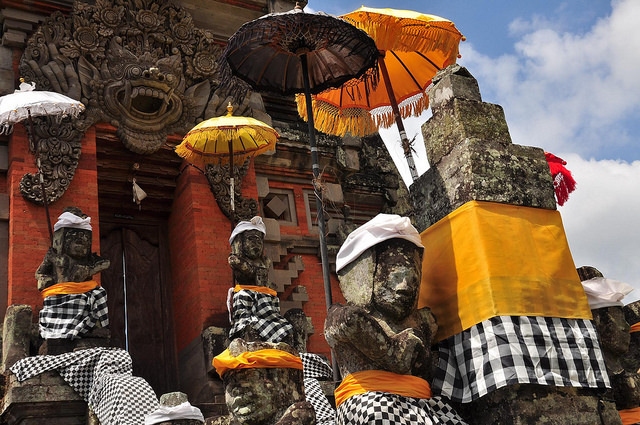
Last month, at the ASEAN summit in India, Indonesian President Joko ‘Jokowi’ Widodo laid out Indonesia’s vision for a ‘stable, peaceful and prosperous’ Indo-Pacific. He said that Indonesia wants an ‘Indo-Pacific regional architecture’ based on the principles of openness, transparency and inclusion, and built through a ‘habit of dialogue’ and ‘respect for international law’ using a ‘building block’ approach. With ASEAN and India as ‘the backbone’ of maritime cooperation, ASEAN-led mechanisms such as the East Asia Summit (EAS) and the Treaty of Amity and Cooperation (TAC) could be coupled with the Indian Ocean Rim Association (IORA) to ‘bridge and integrate’ the Indian and Pacific oceans.
Jokowi’s speech closely echoed Foreign Minister Retno Marsudi’s annual foreign policy speech in early January. She provided a little more detail on Indonesia’s Indo-Pacific vision. Noting the importance of the IORA, ASEAN–India and EAS frameworks, Marsudi conceptualised the Indo-Pacific regional architecture as something resembling ASEAN’s ‘ecosystem of peace, stability, and prosperity’ in Southeast Asia.
She said that Indonesia seeks to work with other regional countries to develop an ‘Indo-Pacific cooperation umbrella’ aimed at supporting confidence-building measures and enhancing a habit of dialogue.
The ‘building blocks’ would include:
While these ideas are yet to be turned into practical policies, it’s significant that Indonesia has now publicly proposed its own Indo-Pacific vision, especially since the foreign ministry’s 2015–2019 strategic planning document mentions the Indo-Pacific only once. Perhaps Jakarta now feels compelled to respond to the US adoption of the Indo-Pacific concept and the prominence given to it during President Donald Trump’s Asia trip in November last year.
To some extent, Marsudi’s Indo-Pacific doesn’t depart fundamentally from the ‘Indo-Pacific treaty’ proposed by her predecessor, Marty Natalegawa, in 2013. While Natalegawa’s idea was based on what he called a ‘dynamic equilibrium’, it also involved extending ASEAN-led mechanisms and instruments to include the Indo-Pacific. His treaty idea, after all, was modelled on ASEAN’s TAC.
Taken together, these ideas suggest the arrival of a distinctly Indonesian conception of the Indo-Pacific—‘an Indo-Pacific with Indonesian characteristics’, if you will—based on three tenets.
First, Indonesia doesn’t challenge other ideas of the Indo-Pacific, such as the ‘free and open Indo-Pacific’ preferred by Japan and the US. Nor does it oppose existing bilateral or ‘minilateral’ Indo-Pacific arrangements, such as the quadrilateral security dialogue involving the US, Japan, India and Australia.
But the inclusionary principle also means that Indonesia doesn’t want a mechanism that targets or excludes certain countries (such as China). In fact, the ‘umbrella’ and ‘building blocks’ metaphors suggest that Jakarta believes that other Indo-Pacific constructs and mechanisms could co-exist with its own preference for multilateral institution building, particularly through ASEAN-led mechanisms and IORA.
Second, Indonesia seeks to promote the ‘ASEAN way’ (including the ‘habit of dialogue’) in the Indo-Pacific through ASEAN-led mechanisms. For Jakarta, any Indo-Pacific regional architecture can’t and shouldn’t undermine ASEAN’s centrality in regional affairs.
Indonesia’s preference is a function of its independent foreign policy and the paramount importance it places on ASEAN. Above all, Jakarta values its strategic autonomy and ‘pragmatic equidistance’ from the major powers. Its push for ASEAN-led mechanisms reflects its concern that great-power politics in the Indo-Pacific could undermine ASEAN’s centrality.
Third, Indonesia continues to rely on existing multilateral forums rather than on bilateral or minilateral ones for the greater Indo-Pacific. We can see this in its promotion of IORA (alongside ASEAN-led mechanisms) as the Indian Ocean grows in importance.
Indonesia’s multilateral zeal stems partly from its historical success with ASEAN and UN institutions and partly from its faith in the ability of multilateralism’s ‘multiplier effect’ to compensate for its lack of strategic resources. The foreign ministry’s budget hasn’t increased much over the past two decades (it averaged US$305 million between 1999 and 2014), and most of the defence budget (roughly US$6–8 billion in recent years) goes to personnel. Indonesia’s economic resources are geared to generating domestic growth. Therefore, its regional and global profiles are best served and amplified through the multilateral forums that it has invested in over the years.
These three traits—co-existence with other Indo-Pacific concepts, ASEAN centrality and multilateral institution building—will continue to shape Indonesia’s approach to the Indo-Pacific. It remains to be seen whether new practical measures will emerge or whether Indonesia’s Indo-Pacific construct will be effective or embraced by the rest of the region.
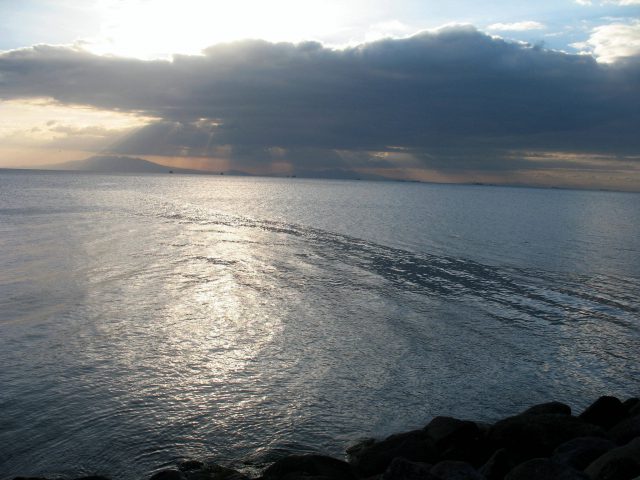
From being a frontrunner in pressing China on the South China Sea disputes, the Philippines under President Rodrigo Duterte is seeking closer relations with China. In his state of the nation address in July last year, Duterte announced that he wants to begin a joint exploration venture with China in the South China Sea, in the area that Philippine government agencies refer to as the ‘West Philippine Sea’. The Chinese hailed the initiative as ‘full of political wisdom’.
A joint development project seems to serve both sides. Duterte may be engaging in conflict management and preventive diplomacy to ease regional geopolitical tensions and avoid confrontation with China. And he may be pursuing economic diplomacy to address the Philippines’ growing demand for energy security. The Malampaya gas field, for example, which supplies one-third of Luzon’s energy demand, will be depleted within a decade.
For China, a joint project would conform to its use of ‘neighborhood diplomacy’ (周边外交) to maintain a stable periphery. After all, Beijing’s professed stance on the South China Sea has always been about ‘shelving differences and seeking joint development’ (搁置争议, 共同开发). Working with the Philippines would also allow China to demonstrate the efficacy of bilateral arrangements while giving it access to new sources of energy.
But the situation is more complicated than it first appears. The joint exploration project involves both ‘disputed’ waters—waters within the Philippines’ exclusive economic zone but claimed by China based on its nine-dash line—and ‘undisputed’ waters that fall entirely within the Philippines’ territory or jurisdiction.
Take the disputed waters first. The Philippines has tried cooperation with China in disputed areas before. Former president Gloria Arroyo signed a joint marine seismic undertaking with China and Vietnam for the period 2005–2008 covering waters claimed by all three countries, although the project didn’t proceed to the extraction phase due to legal and political constraints. And in a unilateral exploration attempt, Manila issued a concession for Reed Bank, located west-northwest of Palawan Island, but it met strong diplomatic and physical resistance from China. No work was completed and Reed Bank remains unexploited.
Technically, the Philippines could develop the West Philippine Sea on its own. In 2016, the Permanent Court of Arbitration (PCA) at The Hague ruled that China’s nine-dash line and associated claims of historic rights run counter to the UN Convention on the Law of the Sea. It also ruled that none of the geological features (let alone artificial islands) in the South China Sea count as islands, which means they can’t be used to determine maritime economic zones. However, China doesn’t recognise the PCA’s ruling and has the hard power to enforce its claims. If the Philippines were to unilaterally recommence exploration of the disputed waters, it would certainly encounter stern opposition from China once again.
Joint exploration in undisputed waters could be more straightforward. In 2006, for instance, the Chinese national offshore oil company signed a commercial agreement with the Philippine national oil company’s exploration arm to explore the Calamian area, which lies north-northwest of Palawan Island. However, that project was put on hold in 2008. Duterte could revive it as one of the first joint venture projects with China.
It seems unlikely, though, that Beijing would accept using a joint venture model in the disputed waters because that could be tantamount to accepting the PCA ruling. Moreover, the Philippine constitution, through a presidential decree, stipulates that Filipinos should benefit more than foreign partners and that the government should receive 60% of net profits in joint venture projects involving Philippine petroleum resources. China would probably baulk at such an inequitable distribution.
There are also fears in the Philippines that if Manila proceeds with the joint project in disputed waters, that may be construed as implicitly validating China’s claims in the area and abandoning the PCA’s judgement. But if the Philippines doesn’t proceed, the hydrocarbon deposits will remain untapped. Manila doesn’t have enough technological capability to develop deep-sea energy resources on its own.
Pushing through with the joint development in disputed waters also entails political risks for Duterte. The Philippines’ credibility with its international allies and partners may diminish if it seems to undercut the PCA ruling. Nationalist groups will perceive any compromise that circumvents the ruling or the constitution as cowardice or treason. When Arroyo signed the joint exploration deal with China and Vietnam, she was accused of selling out the country, trading Philippine territory and sovereignty for Chinese investment.
Despite these difficulties, Duterte’s quest for cooperative relations with China in the South China Sea isn’t at a dead-end. There’s talk in the Philippines of revising the constitution to amend the provisions that limit foreign investment and ownership. If that happens, there could be greater legal flexibility in offering a 50–50 sharing of profits. And a joint venture in undisputed waters could be a confidence-builder that leads to better management of other aspects of maritime security in the disputed waters.
This post was adapted from the author’s presentation at the 4th ASEAN–EU High-Level Dialogue on Maritime Security Cooperation held in Manila last year.

Paul Dibb and Richard Brabin-Smith’s recent ASPI paper, Australia’s management of strategic risk in the new era, is an important strategic piece, which isn’t surprising given its authors. Australia often produces incisive and well-argued strategic-level thinking. But we aren’t so good at the next step down and usually skip straight to force structures with only superficial consideration of the operational concepts that ought to drive them. With that in mind, here’s my attempt at a ‘red team’ appraisal of the argument, first from Beijing and then from Jakarta.
Culture is more important than the West usually recognises. Mao’s military writings accord to some extent with Sun Tzu’s and both retain great influence in Chinese culture. Sun Tzu emphasised the difference between core and non-core interests and keeping your military commitment proportional to the issue at stake. He warned against getting irrevocably committed to wars that could become protracted. Finally, he wrote that the epitome of skill is not to win a thousand battles, but rather to subdue the enemy without fighting.
What might China want from Australia and what Chinese commitment would be proportional? Or, to reverse the question, what pain could China inflict at low effort and what would Australia concede to avoid it? As a trade-dependent nation with poor resilience overall—not just in terms of fuel—Australia is uniquely vulnerable to low-effort coercion by distant blockade. China has no need to put a single sailor or soldier within reach of Australian mainland–based military capabilities. Pressure on key suppliers and a concentrated cyber offensive might even be enough without additional naval effort. Australia also has no clear idea what levers Beijing has among the large Chinese diaspora in the region and in Australia’s major cities and ports. Improving our resilience to blockade might be a more cost-effective investment than equipping to defeat a direct military attack.
If China felt it necessary to escalate to direct attack, what are its best options? Submarine-launched missiles would require the least resources and lead-time. Unless you know the approximate location of a submarine, even a noisy one is nearly impossible to find. Given the area of sea within cruise-missile range of Australia’s major coastal infrastructure, the chances of preventing a submarine-launched attack are miniscule. The mere claim that a submarine is within missile range could have serious psychological and political effects, especially if the question of nuclear escalation was ambiguous. What would China have to gain by bringing higher-signature surface or air forces within reach of Australian mainland–based capabilities?
Australia could spend itself into penury on military kit and still be unable to prevent either distant strategic coercion or a submarine-launched attack. If defence is impracticable, what about deterrence? During the Cold War, France recognised that it couldn’t defeat the Soviet Union and opted for a modest nuclear capability. The Soviets could kill France, but would they be prepared to lose an arm to do so? Nuclear weapons appear to be off the cards for Australia, but what else could we do to make China pause? What are China’s critical strategic vulnerabilities? What levers affect them? Australia will never be able to defeat the giant, but could we put a valued piece of its anatomy at sufficient risk to cause China to prefer options not involving us? That’s too big a question to address here, but it needs more attention than it seems to be getting and it’s directly related to whether our subs should be powered by diesel or by atoms.
Let me remove my Chinese hat and move on to a possible future Islamic Indonesia. The finer points of Islamic jurisprudence may seem odd to Australian leaders, but they’re very important to many Muslims. Western leaders’ theologically illiterate attempts to condemn the actions of ISIS as un-Islamic were easily ridiculed by its media machine by simply measuring them against the Quran and Hadith. In our military headquarters we have advisers on law, equity, gender and a host of other things that don’t matter to our enemies. Where are the theology advisers? How do we avoid encouraging the very thing we’re trying to prevent? The necessary knowledge is readily available within Australia, but it’s not utilised because the problem isn’t recognised.
Perhaps a more likely consequence of a rise of radical Islam would be that the Indonesian state could no longer control the centrifugal forces intrinsic to its structure. Would we see ‘archipelagic balkanisation’, rather than a unified Islamic Indonesia and subsequent state-on-state conflict with Australia? In either case, Australia desperately needs concepts and doctrine for archipelagic warfare. That’s a critical gap that successive force structure reviews have failed to recognise. Consequently, large chunks of our current force are all but unemployable in archipelagic warfare.
What does all that mean for Australia? Many governments have come to recognise that chasing the mythical ‘balanced force’ with the budgets available to them ensures inadequacy everywhere. The art of strategy is deciding what to forgo to fund what’s important. That demands hard decisions. Dibb and Brabin-Smith’s proposals comprise mostly, though not entirely, doing what we do now better, and that has a hint of the balanced force about it. Fully protecting our vulnerabilities is almost certainly beyond our means, but our potential enemies have pressure points too and analysing and exploiting them to make any exchange unattractive may be more achievable with the resources Australian governments will choose to afford.
That would require outside-the-box thinking and might lead to non-traditional force structures, two areas in which Australia has a poor track record. It would have major implications for the nuclear submarine debate and for the utility, or otherwise, of fast jets that can only operate from highly specialised fixed bases. But let’s sort out the strategy before we dive down into choosing the instruments!
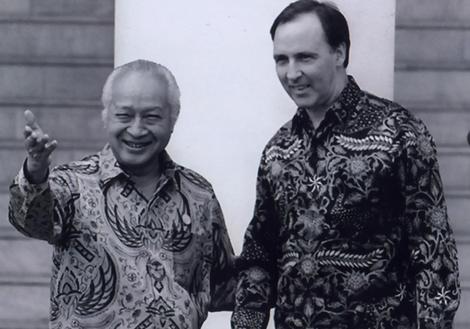
In Jakarta’s presidential palace in December 1995, Australia’s Prime Minister Paul Keating stood with Indonesia’s President Suharto as their two foreign ministers signed a security treaty.
Keating was ebullient. Here was Australia as a regional insider, able to strike a unique bilateral deal with the delphic Javanese leader at the centre of Southeast Asia.
The Agreement on Maintaining Security secretly negotiated with Suharto was a singular achievement that became a failed leap of faith. The mix of bravado and aspiration in the treaty’s creation made it a deal between two extraordinarily different people—Suharto and Keating—more than an agreement between two extraordinarily different peoples.
The announcement of the treaty a few days before the signing ceremony shocked the rest of Southeast Asia as much as it surprised Canberra—and it blindsided the military elite around Suharto.
At the signing ceremony in Jakarta, Australia’s deputy prime minister, Kim Beazley, went up to a group of Indonesian generals he’d come to know when serving as Australia’s defence minister (1984–90) and cheerfully greeted them: ‘Hello, allies!’
The treaty was an uncharacteristic moment for proudly non-aligned Indonesia, marking a moment of sublime acceptance for Keating. And three months later, when Labor was swept from power by Australia’s voters, it became his final grand international gesture. Keating left politics expressing confidence that the security agreement would endure as a monument to Australia’s rightful place in Asia.
On the flight back to Canberra after the signing, Keating confided to Beazley his fear that the treaty would be his last ‘big picture’ moment as prime minister. As Beazley recalls that conversation with Keating: ‘He said to me, “You know, Kim, I think we are going to lose [the federal election].” Which was not good news to a deputy about to fight an election two or three months after that.’
The Liberals had been in opposition for a dozen years, and Keating told Beazley: ‘I think they can do some very silly things. I want to put in place as much ballast that they can live on while they bring themselves up to speed.’
Just as Keating had built his personal relationship with Suharto to achieve the APEC summits, so the treaty was the ultimate expression of friendship between two leaders whose closeness emphasised all their contrasts. As Gough Whitlam jested about Keating’s commitment to Suharto: ‘Paul always preferred older men.’
Beazley reflects that Keating had ‘enormous admiration for the old man’. Indeed, says Beazley, Keating ‘loved Suharto, and Suharto loved him. Suharto regarded him as a son and was enormously protective of him’.
Beazley was speaking ahead of the release by the National Archives of the 1994 and 1995 cabinet records of the Keating Labor government.
The submission Keating put to his cabinet for approval of the deal (with the draft press release to go out immediately after cabinet agreed) is a classic bit of prime ministerial fait accompli. And it’s classic Keating on Indonesia:
There is no country more important to Australia than Indonesia. Australian territory can in effect be directly threatened with military force only from or through Indonesia and Papua New Guinea. Bilaterally, this agreement will:
• provide reassurance that Australia and Indonesia recognise that each has a fundamental interest in the security of the other;
• commit each to cooperating with the other in ensuring their own security and that of the region;
• demonstrate that each has confidence in the intentions of each towards the other; and
• complement the progress that has been made in other areas of the relationship.
It will have, therefore, an important and positive effect on the attitudes of the public in each country towards the other. Through the agreement Indonesia is making a clear statement that it is not a threat to Australia and is committing itself to cooperating with us.
Standing in the presidential palace reporting the signing ceremony, I spent most of my time on the then common ASEAN obsession: staring at Suharto to check his movements and speech and health. The age-old problem of one-man rule is old age. Australia shared the region’s obsession with what would come after the strongman lost his strength. The issue of Suharto’s eventual departure was the justification for the agreement Keating never used in public. But his cabinet submission was explicit:
Whether or not the succession to President Suharto goes smoothly and what direction Indonesia’s policies will take are difficult to predict. While this agreement will not in itself obviate problems for us, it could well help us deal with that period. This agreement is an important long-term structure which will consolidate Australia’s place in the region, reinforce the stability of our region, and help reduce the uncertainties in our future.
Suharto fell in 1998, after 31 years in power, consumed by Asia’s financial crisis. By September 1999 the treaty was gone, abrogated by Indonesia’s military as Australian soldiers entered East Timor at the head of a multinational force to stop the slaughter that followed Timor’s vote for independence.
Ultimately, the logic of the security deal reasserted itself. In November 2006, Australia and Indonesia signed the Lombok treaty—an Agreement on the Framework for Security Cooperation—a broader and more detailed version of what Suharto and Keating attempted. It was among the last big foreign policy wins of John Howard’s government—a rare bit of Howard–Keating symmetry.
But there’s one crucial difference: the Lombok treaty is an agreement between two democracies, not just between two leaders.
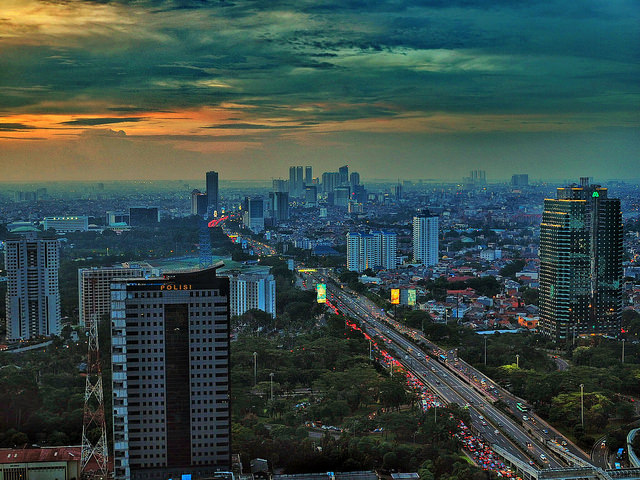
At the World Bank Group’s annual meetings in Washington DC in October, there was notable optimism in anticipation of an upswing in the global economy. The International Monetary Fund’s latest World Economic Outlook projects that global growth will accelerate to 3.6% in 2017, and to 3.7% in 2018. Not surprisingly, investment, trade, industrial production, and business and consumer confidence have continued to increase in several key economies and regions.
Indonesia intends to capitalise fully on this upswing. In 2017, it consistently posted a respectable growth rate of around 5%—better than most emerging economies—owing to increased investment and consumption, and a recovery in exports, partly due to the pick-up in commodity prices. In fact, exports are becoming an increasingly reliable third engine of growth for the country.
Better still, Indonesia’s macroeconomic indicators are sound. The country is experiencing solid growth in new jobs and real wages, and low and stable inflation of around 4%. Moreover, food prices are steady, consumer confidence is strong, interest rates are low, and the exchange rate has remained consistent. Domestic and foreign direct investment have been picking up, too, thanks to increased infrastructure spending.
These positive trends have added momentum to ongoing reforms. After all, the best time to mend one’s roof is when the sun is shining. Accordingly, President Joko Widodo’s government is pushing ahead with key measures that will create a strong foundation for higher long-term competitiveness. And alongside structural reforms, we are pursuing prudent fiscal and monetary policies, with our sights set well beyond the horizon.
The proof of Indonesia’s progress is in the pudding. Indonesia has gained growing international recognition, with three major rating agencies having issued the country an investment-grade credit rating. According to an OECD/Gallup poll, 80% of Indonesians have confidence in the national government—the highest among all countries surveyed.
Moreover, Indonesia’s standing in the World Bank’s ‘Ease of Doing Business’ ranking has skyrocketed 34 places since the current government took office in 2014. Owing to its improved business and investment climate under President Joko Widodo’s leadership, Indonesia has been named a top-10 reformer.
Towards the end of 2017, the Indonesian parliament approved a robust 2018 national budget, which aims to boost confidence further, increase productivity, and enhance the country’s competitiveness. For the past three years, the government has pushed hard to invest in the future by closing the country’s infrastructure and human-capital gaps. The new budget will continue that work by increasing investments in both areas to unprecedented levels.
Even more than our natural resources and strategic location, our people are the most precious assets of all. As the world’s fourth most populous country, Indonesia has a large and vibrant young workforce that will fuel inclusive growth well into the future. Indonesian millennials are more connected, creative and confident than any previous generation. They are our future entrepreneurs, job creators, professionals, civil-society leaders and taxpayers. And they are already competing vigorously in the digital economy, where technological innovations will continue to introduce new opportunities and challenges.
The next generation will have to start preparing today for the jobs and opportunities of tomorrow. To that end, the government has placed special emphasis on investments in human capital. More than 20% of the 2018 national budget is allocated for education and vocational training, and another 5% is dedicated to the health sector.
Furthermore, the government is providing support for the country’s poorest and most vulnerable communities. Through social safety nets, cash transfers, cash-for-work programs and other innovations, we are lifting people out of the vicious cycle of poverty. The government’s flagship ‘Indonesia Pintar’ education program will ensure that around 20.3 million school-age children stay in school. The ‘Indonesia Sehat’ health initiative is expanding access to basic health services for the masses. And large-scale microcredit programs have been introduced to kick-start local economies.
With more than 17,000 islands spread over three time zones, Indonesia is the world’s largest archipelago. Fortunately, ongoing investments in infrastructure will leave the economy more interconnected than it has ever been. As logistical costs fall and efficiency improves, we will likely see the emergence of new growth centres beyond the main islands.
Lastly, the government is working hard to strengthen Indonesia’s institutions. We have introduced a comprehensive tax-reform plan to make collection more effective, and to broaden the tax base. And we are taking steps to ensure financial inclusion, and to improve trade and investment policies, all of which will fuel competitiveness.
Any businessperson or investor who overlooks Indonesia risks missing out on the opportunities offered by a global economic success story. As a member of the G20, Indonesia is the largest economy in Southeast Asia, and on its way to becoming the fifth-largest economy in the world by 2030. When Indonesia thrives, everyone benefits.
Indonesians are doing their part to contribute to the dynamism of East Asia. As the Indonesian economy continues to gain momentum, so, too, will the current government’s efforts to establish a strong foundation for the future.